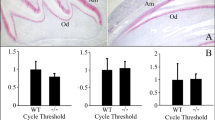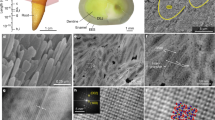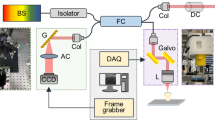Abstract
THE initial stages of the mineralization of tooth enamel have been studied using electron microscopical techniques applied to ultra-thin sections of developing molars and incisors of 1–10-day-old white rats (Rattus norvegicus). The specimens were fixed in either Palade's1 or Dalton's2 fixative, embedded in ‘Araldite’ and cut without demineralization using a diamond knife.
This is a preview of subscription content, access via your institution
Access options
Subscribe to this journal
Receive 51 print issues and online access
$199.00 per year
only $3.90 per issue
Buy this article
- Purchase on Springer Link
- Instant access to full article PDF
Prices may be subject to local taxes which are calculated during checkout
Similar content being viewed by others
References
Palade, G. E., J. Exp. Med., 95, 285 (1952).
Dalton, A. J., Int. Rev. Cytol., 2, 403 (1953).
Fearnhead, R. W., Fourth Int. Conf. Electron Microscopy, Berlin, September 1958, 2, Springer-Verlag (1960).
Fearnhead, R. W., “Electron Microscopy in Anatomy” (Edward Arnold, 1960 b, in the press).
Pinsker, Z. G., “Electron Diffraction” (Butterworth, 1953).
Frank, R. M., and Sognnaes, R. F., Arch. Oral Biol., 1, 339 (1960).
Author information
Authors and Affiliations
Rights and permissions
About this article
Cite this article
FEARNHEAD, R. Mineralization of Rat Enamel. Nature 188, 509–510 (1960). https://doi.org/10.1038/188509a0
Issue Date:
DOI: https://doi.org/10.1038/188509a0
This article is cited by
-
Effects of F- on apatite-octacalcium phosphate intergrowth and crystal morphology in a model system of tooth enamel formation
Calcified Tissue International (1992)
-
Developmental comparisons of murine secretory amelogenesis in vivo, as xenografts on the chick chorio-allantoic membrane, and in vitro
Calcified Tissue International (1980)
-
The ultrastructure of odontogenesis in larval and adult urodeles; differentiation of the dental epithelial cells
Zeitschrift f�r Zellforschung und Mikroskopische Anatomie (1971)
-
The mechanism of prism formation in teeth: A hypothesis
Calcified Tissue Research (1970)
-
The mechanism of ameloblast movement: A hypothesis
Calcified Tissue Research (1970)
Comments
By submitting a comment you agree to abide by our Terms and Community Guidelines. If you find something abusive or that does not comply with our terms or guidelines please flag it as inappropriate.



